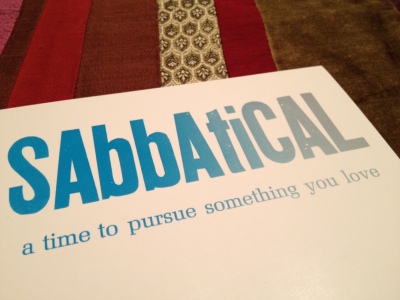In the midst of doing last-minute shopping, decorating, and entertaining for the holidays, I find myself on the eves of Christmas and New Year furiously trying to meet several important work deadlines. While burning the candle at both ends writing and grading, I also find myself from time to time breaking out in a wry smile. The reason? I get to start out the New Year with a one-semester sabbatical leave.
Here’s the deal at my school: we tenured or tenure-track faculty work six full semesters and then, pending approval of our application (which nearly always happens), get to take a break from regular teaching and service commitments in our seventh semester. We get to spend our sabbatical time in any way that we wish so long as we return refreshed and provide a satisfactory account for the work we did (i.e., we submit a report to the Board of Trustees of how we advanced in our teaching, research, and service). Since we are paid our full salaries during sabbatical, such policies can be understood as recognition/additional compensation for prior service and as forward-looking investment into our and our institution’s future.
(Yes, I know how privileged I am. With adjuncts now constituting 76.4% of all faculty in institutions of all types according to a recent report by the American Association of University Professors and with educational institutions clamping down (or at least threatening to tighten up) on sabbaticals for tenure-stream faculty as a cost-saving measure, I am incredibly grateful that my institution has retained its generous sabbatical leave policy.)
The heart of the word “sabbatical” should conjure for anyone familiar with the Bible the notion of “rest” – either for a day, as in the case of God resting on the seventh day of creation and later commanding the Israelites to do likewise (Gen 2:2, Exodus 23:12) or for an entire year, where no work (sowing, pruning, reaping, gathering) was to be done on the land. Regardless of the length of time (day or year), the point has never been to “do nothing” for its own sake, but to spend time honoring God without the distractions of ordinary life as well as to provide much-needed rest for humans, other animals, and the lands so as to enhance all of our ability to “produce” in quality ways for the long haul.
Apparently the origins of the modern sabbatical for professors dates back to the last two decades of the nineteenth century, when ten colleges and universities (beginning with Harvard in 1880) established sabbatical leave programs in the U.S. By 1920, some 40 other institutions had followed suit. Of course the translation of the religious concept of “sabbatical” into any modern educational institution (secular or otherwise) will never be wholesale, but it seems appropriate that academic institutions today retain the heart of the biblical notion, which I understand to be spiritual regeneration and the reconnection as well as righting of relationships with all creation (especially when one factors into one’s understanding of sabbatical the “Jubilee” tradition, see, e.g., Leviticus 25, Luke 4:16-30).
Practically speaking for me, the origins of sabbatical means that I must resist filling my sabbatical time in nearly exactly the same way I do in my regular life. (For faculty like me whose life circumstances–young children in my case–preclude me from jetting off to some foreign locale for a sabbatical stint, sabbatical life mirroring ordinary life, minus teaching and service, is a real temptation). In short, I shouldn’t think of my sabbatical as merely an ability to churn out more of the same, but to bear different kinds of fruit. I need to plan my time so that the quality, not just quantity, of the work I do improves in the aftermath.
So on the top of my list of things to do once the New Year begins is to start at square one in conducting research for my second book. I want to combine recent secular and Christian feminist reflections on forgiveness with the large body of literature on restorative justice to a few cases of historical injustices committed against Asian Americans for which the U.S. government has officially apologized. This will mean that I will spend large chunks of my sabbatical time reading–not writing.
Smaller work desiderata of the type that would make the Board of Trustees happy include:
- catching up on reading broadly in my field–both books I somehow managed to go through graduate school and 10+ years on the job having never read and books that have been recently published in the last few years
- recommitting to learning (Mandarin) Chinese again for both personal and professional reasons (n.b., the last time I had official instruction in the language was in the 1990s)
- attending a few more conferences than the three major ones I attend annually (n.b., new ones in Spring 2015 that my sabbatical leave makes possible include a conference on “moral injury” in San Diego, an ATS-sponsored mid-career faculty roundtable seminar and gathering of racial-ethnic faculty in Orlando, and the second annual Society of Race, Ethnicity, and Religion conference in Denver)
- engaging more directly and conscientiously with local activist and charitable organizations in my area
- revising a few chapters and articles for work-in-progress, keeping in touch with students whose Master’s theses and doctoral dissertations cannot be put on hold simply for my sake, and continuing a few service commitments (such as service on the Presidential Task Force) where a faculty replacement in my absence would prove too disruptive.
 All of those are worthy goals. But items on my bucket list that probably won’t make it on my official sabbatical report, which happen to coincide with what forms a large part of my gleeful anticipation, include:
All of those are worthy goals. But items on my bucket list that probably won’t make it on my official sabbatical report, which happen to coincide with what forms a large part of my gleeful anticipation, include:
- working out daily and perhaps even dusting off my salsa shoes if I can find a willing partner with whom to hit the clubs
- volunteering more at my kids’ schools
- trying out new recipes and cooking more meals from scratch
- indulging the inner crafter-homemaker in me by attempting to do the many activities I have “pinned” on Pinterest (e.g., homemade bath bombs or a DIY tooth fairy door, anyone?)
- going snowboarding again (after literally a 10-year break) and introducing my kids to snow sports.
May the 2014 end well for you and may your 2015 be bright!
Grace Yia-Hei Kao is Associate Professor of Ethics at Claremont School of Theology. She is the author of Grounding Human Rights in a Pluralist World (Georgetown University Press, 2011) and her co-edited anthology with Ilsup Ahn on Asian American Christian Ethics is forthcoming in Fall 2015 with Baylor University Press. She is also co-editing a volume with Rebecca Todd Peters that is tentatively entitled “Encountering the Sacred: A Theological Exploration of Women’s Lives.” Read more about her work on her website.





Grace, I wish you a wonderful sabbatical and hope, as you say, that it equips you to “bear different kinds of fruit.”
LikeLike
Thanks Kecia for your well wishes! :)
LikeLike
When we sleep we dream, and sabbaticals, at their best, are about fulfilling some otherwise impossible to fulfill dreams too. Enjoy the winter holidays, and flourish in the spring, Grace!!
LikeLike
Sarah – beautiful words and may it be!
LikeLike
The importance of time for scholars, free time unencumbered by academic obligations, time to play with ideas, time to learn of new ideas from books or meetings, and time for deep research, is huge and sadly, greatly underestimated by the general public. Your sabbatical privileges are indeed a rare gift. Most academics I know have to “buy” their time by writing grants.
“Time is the most valuable thing a man can spend.” – Theophrastus
LikeLike
NMR: Don’t I know it. I am so incredibly grateful and I appreciate folks like you who “get” it– it is indeed so important for scholars for the long haul!
LikeLike
Enjoy! BTW in our local salsa community, you can just show up. No need to bring a partner. There are plenty of people ready to dance. I hope that is the case where you are! ;-)
LikeLike
Elizabeth – I used to frequent the scene in the early 2000s with a (female) friend of mine; we loved it! Since I don’t know the scene where I live, it would be more fun (and safe) for me to find someone to go with at first!
LikeLike
Enjoy your “day of rest” that lasts a semester. (That’s way cool, the way the day is stretched.) In addition to catching up with everything–you’ve set yourself a tall list!–I hope you get to sit beneath a tree (like the tiger in the cartoon) and gaze up into the leaves and just daydream.
LikeLike
Barbara – thanks for your well wishes. Yes, there’s lots of wisdom in Calvin & Hobbes (the comic book strip I used) and I want to do just that!
LikeLike